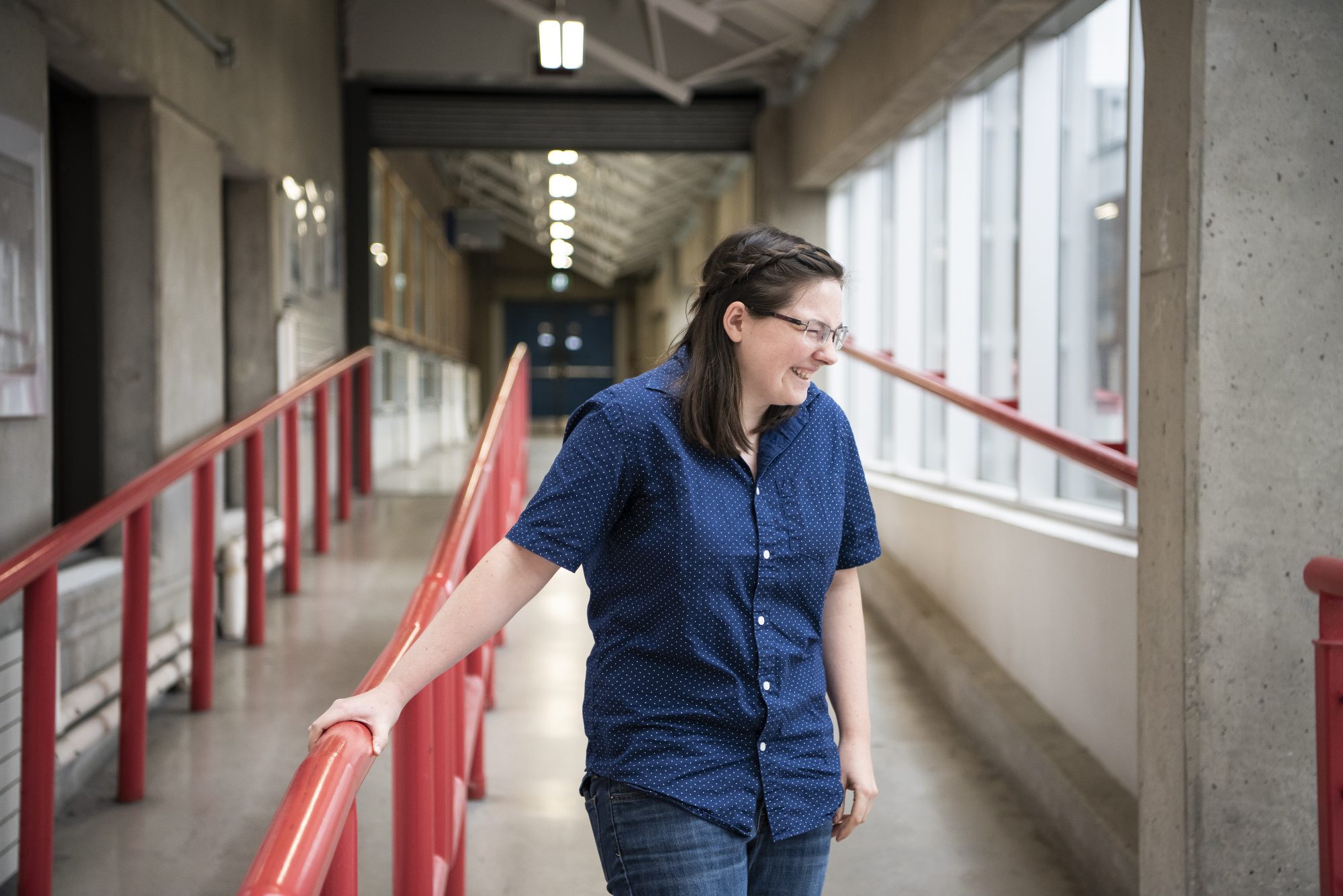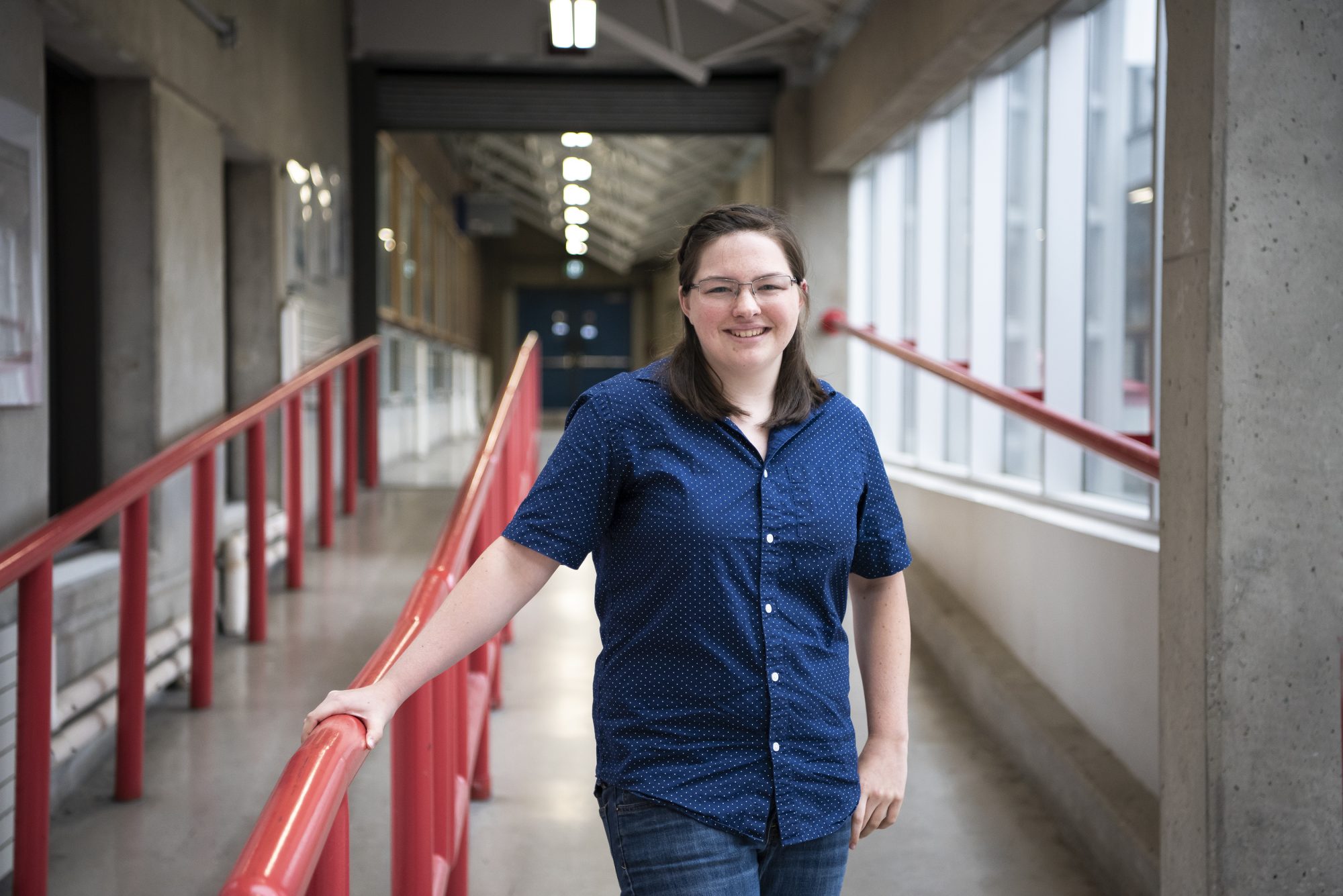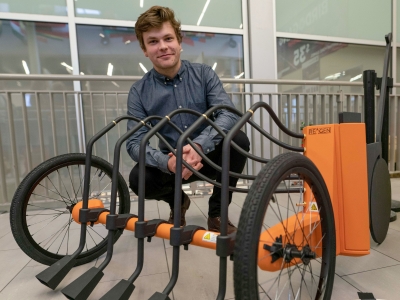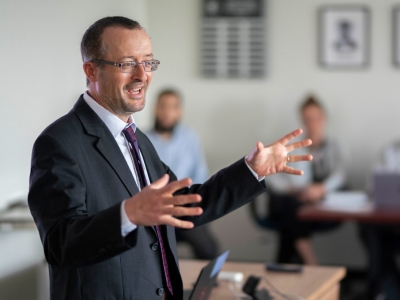By Ainslie Coghill
Asked to reflect on when her interest in engineering began, Megan McEwen tells a story about her ninth birthday, when she ripped the small circuit out of a musical birthday card. Examining the extracted device, she then started pulling the circuits from other cards. She linked them in a series so that when triggered by a tug on a string, a cacophony of tinny music would commence. She stuck them on her bedroom door, then her locker, and inside friends’ school desk drawers for a laugh.
McEwen, now a fourth year electrical engineering student at Carleton University, was a curious and creative child with a passion for building things. She attended a small high school in Windsor, ON, that had a FIRST robotics club with only a few other members. The dynamics of such a small team meant that she could take on several different roles within the group. She was the electrical team lead, then advanced to team captain in time for a FIRST Robotics world championship competition.
When she was younger she dreamed of becoming an astronaut like her heroes Roberta Bondar and Chris Hadfield, but due to medical circumstances obstructing that path, she opted to explore other passions when mapping out her post-secondary pursuits.
A tour of Carleton University four years ago helped her come to a decision.
“I visited a microelectronics fabrication lab, enjoyed the surrounding nature, the great opportunities in Ottawa like national conferences and exhibits, and the really fantastic co-op options,” says McEwen. “Where I’m from, most of the co-op employers are in the automotive industry. Carleton has a lot of opportunities in robotics, software and telecommunications.”
 “Electrical engineering is so pervasive. It’s in my car, my cell phone, my computer…we can reach out and touch it. People mistakenly assume it’s a program that’s all theoretical,” she says.
“Electrical engineering is so pervasive. It’s in my car, my cell phone, my computer…we can reach out and touch it. People mistakenly assume it’s a program that’s all theoretical,” she says.
“When you think of electrical engineers, you might think of men in hard hats looking at telephone wires,” she laughs, “but it’s so much more than that.”
While the theoretical aspect of the program doesn’t always come easy, it’s not all about math, stresses McEwen. For her, math is simply a tool she uses in her creative process. Take, for example, her semester-long 3rd year group project: to design and create a microcontroller robot alongside a team of five other students with a budget of only $100 and no instructions or kit.
They decided to make a robot that detects and extinguishes fire, and each team member brought different skills to the project. For McEwen, the sole woman on her team, the soldering experience she acquired during a co-op term at Nokia made her the best candidate for micro-soldering circuits onto boards.
“We didn’t have anything pre-assembled, so everything we designed had to be carefully laid out on a board and soldered without accidentally shorting parts of the circuit,” she says. “That did happen a few times, but hey, that’s learning!”

McEwen designed the robot’s motor control circuit, helped with the power regulation system, and made the water transportation system. The mini fire-fighting robot’s water tank was a root beer can glued to a coffee cup, zip tied to the back of the bot, and carried water via plastic tubing she found at Home Hardware. With only $100 dollars to spend, the team had to get imaginative, which was perhaps one of the most valuable components of the exercise.
“Engineering means creative innovation, especially on a budget like that,” says McEwen.

McEwen holding her team’s microcontroller fire-fighting robot, 2017
Throughout her time at Carleton she has gained other skills that will likely benefit her as she moves on to the workforce – in her case, one that is predominantly made up of men.
“I’ve learned to self-advocate…sometimes more than I would like to…and to champion my own ideas. I need to believe in what I can do in order to make it happen,” she says. “As a woman, there are times I’ve felt intimidated, or compelled to second guess my instincts. Of course, there are times that I’ve had bad ideas, but it’s important not to fear failure, and to have trust in myself,” she adds.
“I’ve been told many times ‘Oh, wow! Good for you!’ when people find out I’m in electrical engineering. Sometimes that enthusiasm is coming from a place of ‘You’re doing something a lot of young women don’t,’ and I wish that wasn’t the case,” says McEwen.
Electrical engineering at Carleton offers a well-rounded student experience, and the program’s students are of particular value to employers. Even still, McEwen remembers a co-op position she nearly didn’t apply for because she felt she was under-qualified.
“I was intimidated by the application because I hadn’t worked in those areas,” she says. “But a male friend of mine who also didn’t have the full set of skills applied, and encouraged me to do it too, and sure enough I got an offer.”
So far, she has completed co-op terms with Nokia, the Communications Research Centre (a government research facility under the Ministry of Innovation), and is looking forward to an upcoming position with Ross Video, a company that designs and manufactures equipment for live event and video production, where she’ll be working on hardware robotics.
“The robotics team works on things like studio robotic camera systems. I’m really excited to see how hardware design works with moving parts,” she says, “and I’m looking forward to working on real products that are used by people every day.”
McEwen is a member of both Carleton University Women in Science and Engineering (CU-WISE) and Carleton’s Chapter of Engineers Without Borders – both organizations of engineering students that identify opportunities for young women and girls, effect positive social change and champion global development initiatives. She also volunteers to help run Eng-Frosh each year.
“Carleton’s engineering community looks out for one another, and students here are super collaborative and helpful to one another,” she says.
Her advice for those considering electrical engineering?
“People might not realize how accessible it is. You never know until you try it. Take something apart, try your own project, and be willing to persist when it seems like it’s too hard,” she says. “Find your spark. Because seeing it come together and all your hard work paying off is amazing. When that little fire-fighting robot first started moving, I shrieked!”

Wednesday, October 17, 2018 in Co-op, Electrical, Feature Stories, Undergraduate, Women in Engineering
Share: Twitter, Facebook



